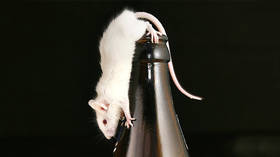Cure for alcoholism? Scientists discover brain circuit that controls compulsive drinking

Scientists have opened up the possibility of creating a cure for problem drinking after discovering a brain circuit that controls the compulsive consumption of alcohol.
The question of why some people develop drinking problems while others don’t has long puzzled scientists. The researchers could finally solve the complex question if their discovery in mice is found to also apply to humans.
While much of the previous scientific literature examined alcohol’s effects on the brain, a team of scientists from the Salk Institute in California focused on proving that brain circuits can make some people more likely to be alcoholics.
“We’ve found [for the first time] a brain circuit that can accurately predict which mice will develop compulsive alcohol drinking weeks before the behavior starts,”explained lead researcher Kay Tye.
This research bridges the gap between circuit analysis and alcohol/addiction research, and provides a first glimpse at how representations of compulsive alcohol drinking develop across time in the brain.
The team created a test to examine how susceptibility toward alcohol consumption interacts with experience to create mice with drinking problems.
Through a series of tests, they observed that the mice could be sorted into three groups: low drinkers, high drinkers and compulsive drinkers. Unlike the first two groups, the compulsive drinkers showed insensitivity to negative consequences, such as when the scientists made the alcohol taste bitter.
Also on rt.com Selling drugs that make you feel better about being ill: Big pharma’s push to oversell ADHD medsThey then used special imaging techniques to chart the cells and brain regions of interest prior to drinking, during drinking, and after drinking alcohol.
Paying particular attention to neuron activity in two regions involved in behavioral control and responding to adverse events, they found that the development of compulsive drinking was related to neural communication patterns between the two brain regions, and was a biomarker for predicting future compulsive drinking.
In a fascinating next step, the researchers used light to control the activity of the neural pathway. In a potential breakthrough discovery, they found that they were able to either increase compulsive alcohol drinking or reduce it by turning the brain circuit on or off.
The researchers next plan is to sequence these neurons in order to identify the ones that could be used to treat people with alcohol problems. The full findings of the study were published in the journal Science.
Also on rt.com With ‘dopamine fasting’ becoming a thing, Silicon Valley embraces its religious sideLike this story? Share it with a friend!













